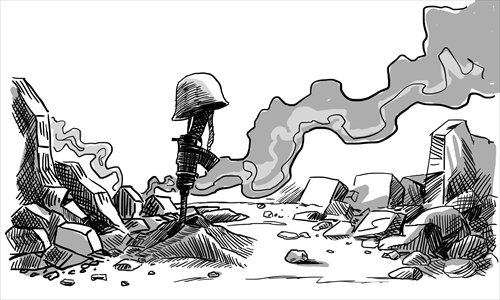Afghanistan no prize for great powers after US withdrawal

In 2001, the US defeated and overthrew the Taliban regime within two months, which was hailed as an impressive victory. Under the flag of anti terrorism and encouraged by initial victory in the Afghan war, the US launched an aggressive geopolitical strategic offensive in South Asia and Central Asia. The US built military bases in Central Asian countries, and maintained a land route between South Asia and Central Asia through Afghanistan.
But the happy hour of the US in Afghanistan was not sustained much longer. After 2005, the security situation there began to deteriorate. The US has been forced to devote more and more blood and treasure to the country. At the highest point, the US deployed around 100,000 soldiers, and its allies deployed another 50,000 military personnel. But all of these measures haven't stopped Afghanistan's fall into chaos.
On May 20, 2012, 28 NATO countries and Afghan war partners met in Chicago and published a statement: NATO will end its field military operations before the middle of 2013 and will evacuate most of its military forces from Afghanistan before the end of 2014.
This means that the US abandoned its goal to build a country in its own image. But the retreat cannot bring peace and stability to the region, and won't stop other powers' intervention in regional and Afghan affairs.
Will a strategic vacuum be left behind, as some have claimed? To look for answers, we need to consider a range of factors, from US military intentions to the past history of a country which, after successive military disasters by foreign invaders, became known as the "graveyard of empires."
The US will remain the key actor on the Afghan strategic chessboard after 2014. The US will withdraw troops and will hand over security duties to Afghan government. But this does not mean the US would leave completely.
The US will maintain a limited, but appropriate scale, of military force and continue to provide significant funds.
Wherever the US focuses on becomes significant strategically. Consequently, the continued US presence will keep drawing international attention and support to Afghanistan. No any other country can dominate the Afghan situation while the US maintains a presence.
The Afghan political situation after 2014 will be another important factor. With international support, particularly billions of dollars from the Western countries, the Afghan central government will continue to operate, even if not smoothly.
A workable central government can prevent any other country from dominating the whole of Afghanistan through Kabul's political channels. Afghanistan will stand as an independent sovereign state, and other countries can only exert influence by indirect means, and mostly at the local governmental level.
Neighboring countries' policies toward Afghanistan will be very important. Traditionally, when a dominant country retreats, others will fill up the strategic vacuum soon or late. But Afghanistan is different. As the "graveyard of empires," Afghanistan is a good strategic field between world powers, but not an appropriate target to conquer. Afghanistan has an important geopolitical position, but lacks strategic resources for exploitation.
Historically, many countries, including the British Empire and the USSR, invaded Afghanistan not to occupy it but to protect themselves or prevent competition from expansion.
When these countries' grand strategies changed, the strategic significance of Afghanistan was also greatly changed.
For example, during the USSR's invasion, the US and its allies contributed lots of dollars, weapons, and other equipment to Afghan guerrillas. But when the USSR retreated, the US also left.
The current situation is very similar to the 1980s. Many countries' interest in Afghanistan is the result of the US military presence. Following the US retreat, the neighboring countries' attention will shrink, or even entirely disappear. No country will be likely to succeed the US there.
Non-state actors, including local warlords, terrorist groups, religious extremist groups, and local military groups will play a more important role after 2014. Some of them, such as the Taliban, will establish real local governments rather than the shadow governments they have today. Every group will find some international support and will dominate certain areas or regions. They will coexist with Afghan government as well as with other countries in the long run.
After 2014, the US will not leave Afghanistan completely and many other actors, including neighboring countries, Russia, India, the Persian Gulf countries, and others, as well as lots of non-state actors, will find their place and exert influence to some degree in an easier way than before. But no one will replace the status of the US, and no country wants to do so.
After 2014, there will be no strategic vacuum, and no dominant actor in Afghanistan. Instead, the country will see a more complicated, diversified strategic and political structure.
The author is an associate professor at the Center for American Studies of Fudan University. opinion@globaltimes.com.cn